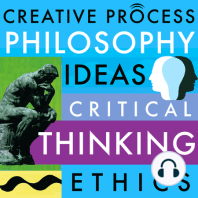13 min listen

Highlights - Lars Chittka - Author of "The Mind of a Bee” - Founder, Research Centre for Psychology, QMUL
Highlights - Lars Chittka - Author of "The Mind of a Bee” - Founder, Research Centre for Psychology, QMUL
ratings:
Length:
15 minutes
Released:
Sep 7, 2022
Format:
Podcast episode
Description
"So I think this observation that there are sensory cues available that are, either completely different to what's available to us, including a magnetic compass sense that's accessible to some animals, but not us. And also within the sensory modalities that we have available, you find often that different animals, including bees use them completely differently or have a completely different spectrum. So bees can see ultraviolet light. We cannot. And bats can hear ultrasound, but we cannot.And we think because the way we sense our world is comprehensive and it feels comprehensive to us. And we feel that there is a validity to how we see it, we think that is a kind of complete picture of the environment and a vertical representation of what is out there. That is not the case. So other animals see the same world completely differently from how we do. And so there are limitations. We only perceive certain parts of the environment. Those parts that evolution has given us the kinds of sensors for that have been beneficial in our evolutionary past, but it's by no means a vertical or complete reflection of the environment."Lars Chittka is professor of sensory and behavioral ecology at Queen Mary University of London, where he founded a new Research Centre for Psychology in 2008 and was its scientific director until 2012. He is the author of The Mind of a Bee and is the coeditor of Cognitive Ecology of Pollination. He studied Biology in Berlin and completed his PhD studies under the supervision of Randolf Menzel in 1993. He has carried out extensive work on the behaviour, cognition and ecology of bumble bees and honey bees, and their interactions with flowers. His discoveries have made a substantial impact on the understanding of animal intelligence and its neural-computational underpinnings. He has published over 250 peer-reviewed articles, and has been an editor of biology’s foremost open access journal PLoS Biology since 2004. He is an elected Member of the German National Academy of Sciences (Leopoldina), a Fellow of the Linnean Society and Royal Entomological Society, as well as the Royal Society of Biology.http://chittkalab.sbcs.qmul.ac.uk/Lars.htmlhttps://press.princeton.edu/books/hardcover/9780691180472/the-mind-of-a-beehttps://journals.plos.org/plosbiologywww.oneplanetpodcast.orgwww.creativeprocess.infoPhoto credit: Markus Scholz / Leopoldina
Released:
Sep 7, 2022
Format:
Podcast episode
Titles in the series (100)
Highlights - William Irvine - Author of “The Stoic Challenge”, “A Guide to the Good Life”: Conversation about Stoicism, Stoic philosophy, critical thinking, tools for living, writing, mindfulness, spirituality by Philosophy, Ideas, Critical Thinking, Ethics & Morality: The Creative Process: Philosophers, Writers, Educators, Creative Thinkers, Spiritual Leaders, Environmentalists & Bioethicists